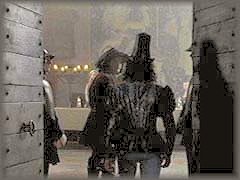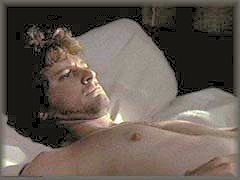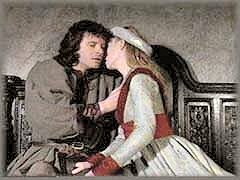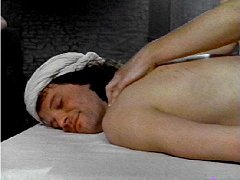 Marcia: Marcia:
Are we still looking for the other Look? He gives Samira a powerful
stare while she is dancing in that red outfit. This is my choice.
There is much to admire in this movie—all Courtois, of course. He seems
to have the only intellect capable of acknowledging the all-too-human attributes
of the peasant class and the inhumane, above-the-law attitude of the monied
class and the church. A man out of his own time, I think. It gives a certain
poignancy to his portrayal.
 Another
Darcyism—the dislike of the hunt. We have noticed Darcy did not fire his
weapon during the hunt scene. In TA, he spurns an invitation to a hunt.
Hmmm! Does this happen in any other of his movies? Another
Darcyism—the dislike of the hunt. We have noticed Darcy did not fire his
weapon during the hunt scene. In TA, he spurns an invitation to a hunt.
Hmmm! Does this happen in any other of his movies?
Kate:
OK, this one I can clear up, though I haven't seen the movie. (It does
sound interesting, though!)
First, it is important to understand that the legal systems and professions
in England and the rest of Europe were and are quite different. England
(like the US and most ex-British colonies) has a system based on common
law. Europe and most of the world have a system based on the ancient law
of Rome, now known as civil law.
Entry to the legal profession in England, like many other trades, was
through an apprenticeship. One signed articles of clerkship and learned
on the job. In the late 18th century, the legal profession began to divide
into: (1) solicitors, who had direct dealings with clients and handled
paperwork and commercial matters, and (2) barristers, who appeared in court
and could only be hired by a solicitor on behalf of a client. In England,
all barristers have chambers at one of the Inns in London. They are the
ones who get around in wigs and gowns. Barristers might have done a degree
in classics before going to be a "pupil" to another barrister at Inns;
they all work for themselves and not in partnership, unlike solicitors.
In countries with a divided profession, "lawyer" is a catchall term
which could cover solicitor or barrister. Ditto for "attorney." We tend
not to use "advocate" as a title—more as a verb.
In Europe, where studying the ancient Roman law required Latin, a university
degree would have been a must. Indeed many legal transactions were carried
out in Latin until quite late. Moreover, there was no division in the profession
in the same way as occurred in England. Modern European lawyers use lawyer,
advocate or attorney.
European law had a huge updating during Napoleon's time. The Napoleonic
Code became the basis for legal systems across continental Europe and much
of the modern world, in modified form.
Heide:
Well, we know our Richard Courtois was an honorable man. Now, thanks
to Kate, we know he was a learned man as well, although a bit naïve.
Didn't know he was in a brothel? "Good God, I never give Maria a sou."
Darcy looks, Karen? Hmmm. Only one hit me, although I agree with Marcia
about watching Samira dance. My choice is when the Seigneur pointedly looks
at Richard in the courtroom and says, "So a man known to have lain with
a heathen woman might forfeit his life." Of course, that Darcy look is
pure anger, not lust.
Karen:
(Kate) though I haven't seen the movie
Wot? ;-) Despite this void in your education, Kate, great summary of
the legal profession.
Anyway, if you haven't had info overload, I did manage to extract a
few references to universities, the law, and masters!
Maitres of the Universe circa 1452
After having checked to see when the movie was set (1452), I've concluded
they should have set it about 50-75 years before, but that is another matter.
There is quite a muddling of facts, which should surprise no one. (For
example, there were no Jews in France at that time, having been thrown
out earlier.) Anyway, this would have been considered the end of the Middle
Ages. The Renaissance, having just begun in Italy, would not have affected
this part of Europe at this time. Great achievements in learning/culture
were concentrated in the High Middle Ages, which ended by about 1300. The
Plague was around 1348 and then sprung up sporadically for the next 50
years.
Relating to the law and universities, I have found the following:
The twelfth and thirteenth centuries saw the founding of the
first universities....[T]he early University of Paris, for example, was
a body of men, young and old, interested in learning and endowed by law
with a communal name and being....It might consist of distinct schools
or "faculties"—the combination of theology, law, and medicine, as at Paris,
was the most usual. It held examinations and awarded degrees, whose meaning
and value were recognized throughout the Latin West. The degree, which
originated as a license to teach, admitted its holder to certain honors
or privileges such as those of a craft guild. (Palmer and Colton, p. 36)
Another pillar of strength of the Church was its control of education.
There were, to be sure, some secular schools designed to teach budding
merchants how to write and keep accounts; but these were unimportant in
comparison with ecclesiastical educational institutions. Higher education
was carried on in universities. These originated as guilds of teachers
or, in some cases, of students. The teachers were all members of the clergy
and most of the students were clergymen also. (McNeill, p. 300)
After mastering the seven liberal arts, a medieval student was prepared
for more advanced study. Three faculties arose: law, medicine and theology.
Law had two branches: the study of Roman law, as embodied in Justinian's
code, and the study of canon law. (McNeill, pp.321-2)
 The
Look The
Look
Yes, Marcia, he gives her The Look when she first enters the banquet
room and before she starts dancing (yes, before she is inverted so that
she nearly falls out of her top).
Marcia:
We all notice the Darcyisms in his other movies, but have you tried
to find other isms of the roles CF played in anything other than P&P2?
I cannot make Darcy into Richard, nor Geoffrey, nor Paul for that matter.
Is he that different in P&P2? that it is singular in his œuvre?
Perhaps, that is why we are here, after all!
Renate:
Whenever I see Jeannine the witch sentenced to death, I pity her. It's
so unfair. Just because the deal of a clever lawyer didn't work, she had
to die. I also think it is not so bad after all because Mrs. Ferrars finally
got what she deserved! There's some justice in the world. :-) Harriet Walter
does a great job in both roles.
Arami:
(Marcia) Is he that different in P&P2 that it is singular in
his œuvre?
Quite. As far as is known, virtually all his roles except Darcy were
more or less readily accepted by him when offered, but he had to be especially
persuaded to take on Darcy, initially against his own instinct and wishes.
And with a glorious result.
Laura:
The Advocate (R)—Contains graphic medieval profanity, explicit sex
and the kind of irony the MPAA would need Cliff's Notes to understand.
I saw this and got such a chuckle from it because it is so true.
 I'm
surprised no one mentioned one of my favorite scenes: the well-timed rooster
call! I'm
surprised no one mentioned one of my favorite scenes: the well-timed rooster
call!
Marcia:
I wasn't sure how to put the barnyard fowl's readiness to crow again
and the look of indignation turned to curiosity as he grabbed the sheets,
then to acceptance. Very nice, indeed ! He is hard on the structure of
the bed. Old oak! That takes great thrust to penetrate.
 Karen: Karen:
Anyone catch where Filette's hand went when they were seated in the
hallway and her father and his entourage walked by?
Allison:
I saw the unexpurgated version on the BBC about two years ago and have
watched the video. It is a fun film. I like the idea of Courtois trying
to uphold standards of decency and honour in a world full of squalour and
ignorance.
(Laura) one of my favorite scenes: the well-timed rooster call!
In the uncut version, this was even more graphic. It was shown on BBC
just after P&P2 had finished. The sight of CF in such glorious detail
definitely confirmed my devoted fandom.
(Karen) one didn't even need a university degree to be a lawyer in
19th century England
It has only been in the last 25-30 years that a university degree is
necessary to be a solicitor or barrister in England. Not very relevant
to medieval France, but I thought I would just add that.
Laura:
(Allison) The sight of CF in such glorious detail definitely confirmed
my devoted fandom.
I really wish that Americans weren't so prudish. I would not have minded
the cock-crowing scene at all. I would've had a nice little smile on my
face.
Maggie:
Please tell me how much of CF did they show in the uncut version? Did
anyone notice a scar on his stomach in the spa scene?
 Allison: Allison:
(Maggie) Please tell me how much of CF did they show in the uncut
version?
I do not want to get you too excited. In the cock-crowing scene, you
do not see any more of CF. It is just that the action is more graphic.
There is one shot of all of him as he is walking through the woods with
the gypsy girl. It was shot about two miles away. I would love to see the
uncut version again so that I could just check it out. All in the interest
of art, of course.
Arami:
(Maggie) Did anyone notice a scar on his stomach in the spa scene?
I can't recall the scar. Where exactly? But I'll rush to my video immediately
and re-examine. All I do remember is his hairy chest, that's also quite
nauseating. ;-)
(Allison) one shot of all of him as he is walking through the woods
with the gypsy girl
I believe this scene is actually missing from the American version.
Is that right?
Bethan:
(Allison) In the uncut version, this was even more graphic
Richard Courtois is certainly very versatile and athletic in the uncut
version! There are four variations (at least) on a theme! I've only ever
seen The Hour of the Pig but I assume that in The Advocate the third variation
was cut. I remember thinking "oooh, Mr Darcy wouldn't do that!" (or would
he?!) :-)
 (Maggie)
Did anyone notice a scar on his stomach in the spa scene? (Maggie)
Did anyone notice a scar on his stomach in the spa scene?
No, but I did notice the scratches on his back. Was this a case of
poor continuity? The same scratches appeared in the later scene after the
cock crowing (when the serving girl asks him to teach her to read). Am
puzzled!
The Advocate is one of my favourite CF movies, intelligent and entertaining,
with a full quota of Colin.
Arami:
(Bethan) the scratches on his back. Was this a case of poor continuity?
I think the scratches are meant to have been there from previous encounters,
i.e., before he arrives on the scene, meaning to show Richard wasn't shy.
Honourable, yes, but not timid.
Heide:
(Allison) There is one shot of all of him as he is walking through
the woods with the gypsy girl
All of him? At what point in the movie does this take place? Why in
the woods?
Allison:
(Heide) All of him?
One of the great sadnesses of my life is that I did not tape the uncut
version. I am hoping that it might be shown again, in which case I shall
be prepared. . |
 Marcia:
Marcia:
 The
Look
The
Look
 Another
Darcyism—the dislike of the hunt. We have noticed Darcy did not fire his
weapon during the hunt scene. In TA, he spurns an invitation to a hunt.
Hmmm! Does this happen in any other of his movies?
Another
Darcyism—the dislike of the hunt. We have noticed Darcy did not fire his
weapon during the hunt scene. In TA, he spurns an invitation to a hunt.
Hmmm! Does this happen in any other of his movies?
 I'm
surprised no one mentioned one of my favorite scenes: the well-timed rooster
call!
I'm
surprised no one mentioned one of my favorite scenes: the well-timed rooster
call!
 Karen:
Karen:
 Allison:
Allison:
 (Maggie)
Did anyone notice a scar on his stomach in the spa scene?
(Maggie)
Did anyone notice a scar on his stomach in the spa scene?